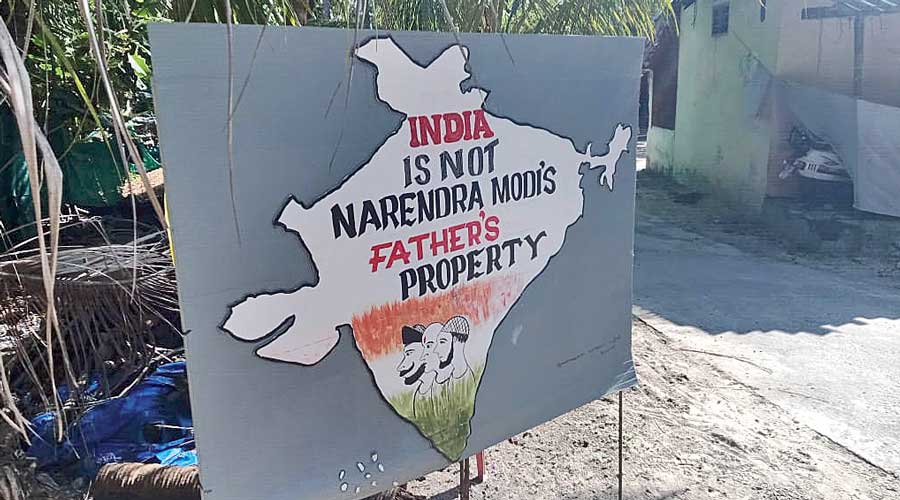The sedition FIR against filmmaker Aisha Sultana is not the first such case registered in recent months in Lakshadweep, where three politicians were booked on the same charge last December over a hoarding put up against the new citizenship matrix.
Section 124A (sedition) of the IPC was invoked against Lakshadweep Congress president M.I. Attakoya and CPM leaders P.P. Rahim and Askar Ali after they received bail following their arrest on lighter charges on December 15, 2020.
The hoarding against the Citizenship Amendment Act that led to their arrest carried the line “India is not Narendra Modi’s father’s property”, written in English over a map of India. It featured three men — a Hindu, a Muslim and a Sikh — to portray communal amity.
Attakoya’s son and lawyer Ajmal Ahmed said the hoarding had stood at an obscure spot near the Muhiyudheen mosque in Kavaratti for about a year — from the time the anti-CAA protests had erupted in December 2019.
But a case was registered only after Praful Khoda Patel took charge as Lakshadweep administrator on December 5. It’s unclear whether Patel had directed the police to book the case.
Attakoya, joint convener of the Constitution Protection Samiti, an initiative by all non-BJP parties in Lakshadweep that organised protests against the new citizenship matrix, said he suspected foul play in the case against the three politicians.
“We were named in the FIR although none of us had any idea who installed that board,” Attakoya told The Telegraph on Saturday over the phone from Kavaratti.
“I first saw that board at the police station when I was summoned to appear before the inspector. Strangely, I found ‘Constitution Protection Samiti’ written, possibly with a pen, at the bottom right corner of the board.”
Attakoya, Rahim and Ali are among the topmost leaders of the Samiti.
Attakoya stressed: “We had stopped protesting after the then administrator Dineshwar Sharma assured us that the citizenship matrix would not affect us.”
The trio were charged under IPC Sections 505-2 (statements creating or promoting enmity, hatred or ill-will between classes), 290 (public nuisance) and 120B (criminal conspiracy) read with 34 (common intention). They were arrested and remanded in 14 days’ judicial custody.
On December 17, the judicial first-class magistrate on Androth island granted them conditional bail. The prosecution appealed unsuccessfully against the bail before the sessions court in Kavaratti.
Days later, “the prosecution added 124A without any reason”, Attakoya said. However, the trio were not rearrested.
Attakoya said the case had not been heard since then because the judge got transferred. The Kozhikode district court was put in charge of the cases but “I assume it’s the lockdown that kept the case from being taken up”, he added.
Rahim too said he had no idea who had painted and installed the board.
“The protests against the CAA and the NRC were total as everyone participated. There were lots of banners, hoardings and posters... we don’t know who put that particular board there,” he said. “We shall fight it out in the court since we are innocent.”
The sedition case against the trio has not received the sort of attention attracted by Thursday’s sedition case against Aisha, a non-politician and a filmmaker, actress and model.
Aisha has been booked for her reference, during a TV debate, to a “bio-weapon” in connection with the Covid surge in Lakshadweep since Patel’s appointment.
Lok Sabha member A.M. Ariff of the CPM has written to the new chairperson of the National Human Rights Commission, Justice Arun Kumar Mishra, seeking his intervention to protect Aisha’s rights.
“As you may be aware, even last week, the Hon’ble Supreme Court while quashing the sedition case against senior journalist Vinod Dua had upheld the view in the Kedar Nath Singh judgment (1962) that application of the provision of 124A should be limited to ‘acts involving intention or tendency to create disorder, or disturbance of law and order; or incitement to violence’,” Ariff’s letter says.
“Evidently, the remarks of Ms Sultana do not fall in any of the above categories and there is every reason to suspect that the move is at the behest of the present administration of the islands to suppress the voices against it.”











